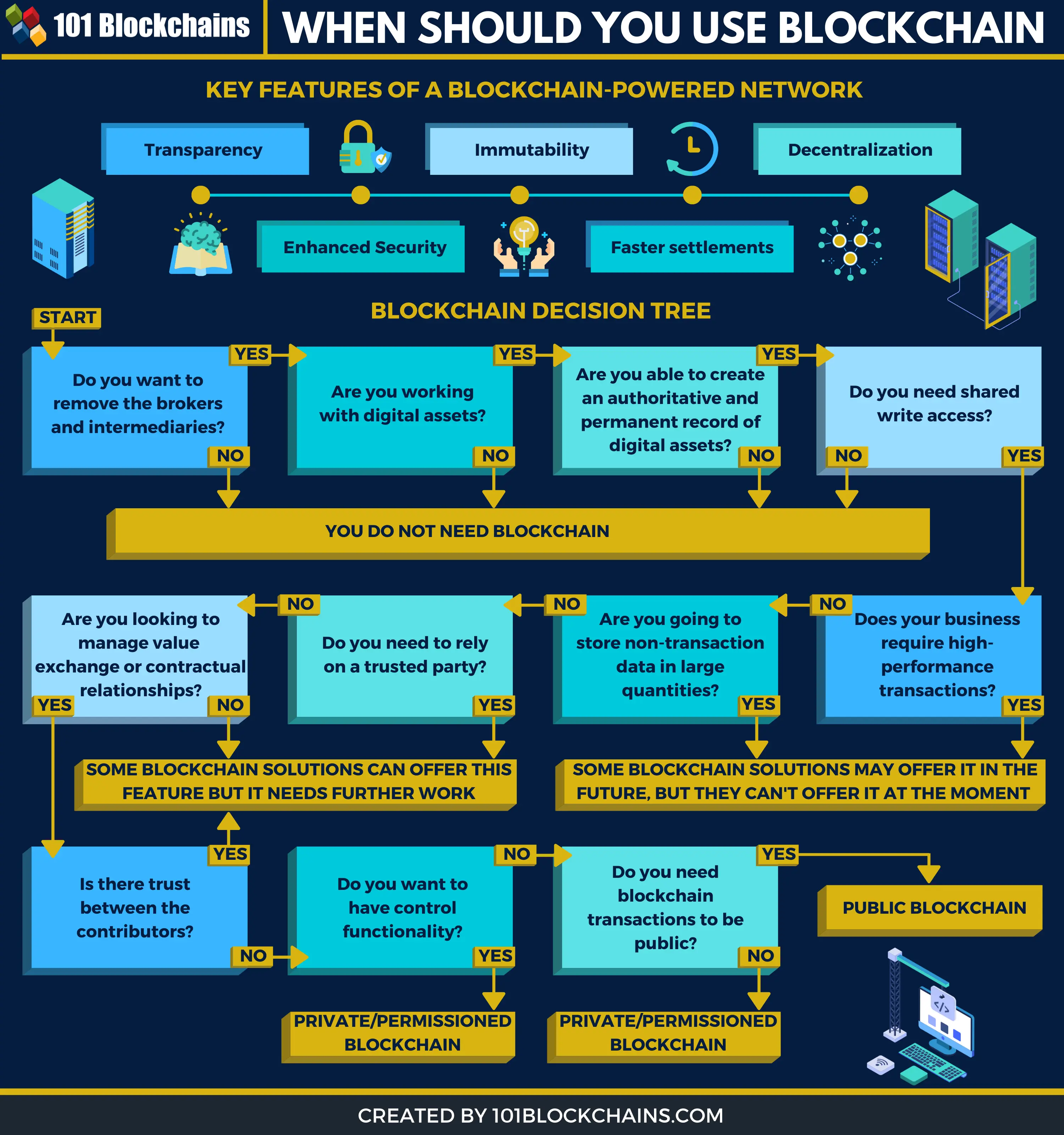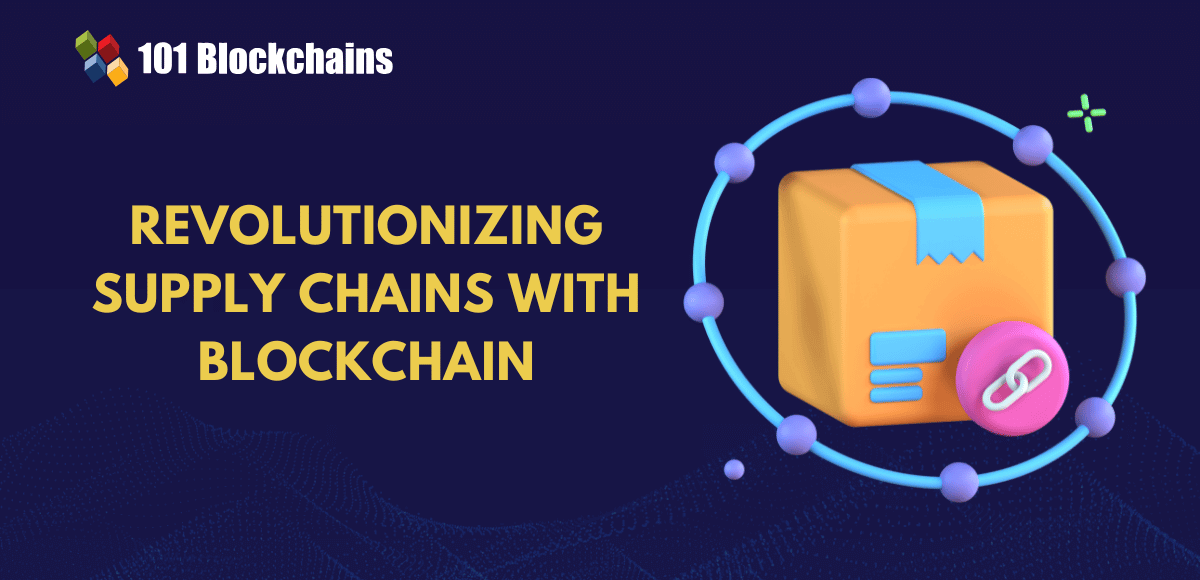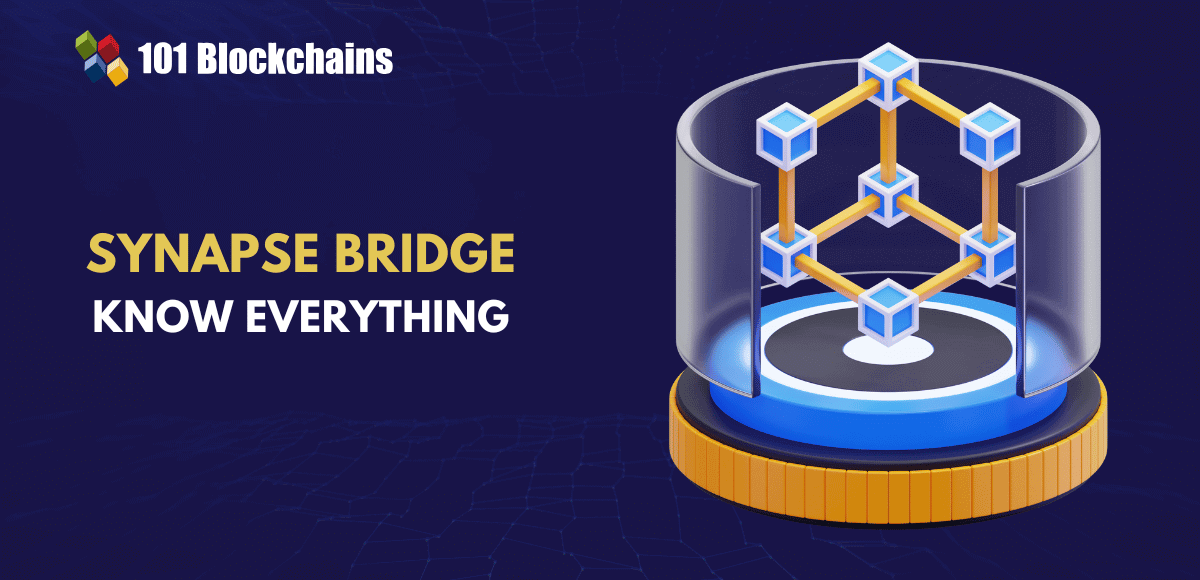Learn how blockchain truly works, master key definitions, and uncover what makes smart contracts so "smart." Dive into the fundamentals, gain valuable insights, and start your blockchain journey today!

- Blockchain
101 Blockchains
- on June 29, 2020
When To Use Blockchain Technology?
Blockchain is a lucrative technology, but for businesses, it is hard to decide when to use blockchain or when not to use blockchain. After all, blockchain has not become mainstream or mature yet.
Blockchain is going to change how businesses work and process information for consumers. As a business, you might think of using it to enhance your business and be one of the first movers. But, it is tough to decide what’s the best approach and whether you should make the jump at all.
In this article, we will be focusing on when to use blockchain and when not to use blockchain. These questions also lead us to another interesting one: when will blockchain become mainstream?
Build your identity as a certified blockchain expert with 101 Blockchains’ Blockchain Certifications designed to provide enhanced career prospects.
How Blockchain Works And Its Benefits
A blockchain is a decentralized approach where peers can communicate and validate transactions without depending on a centralized entity. This change from centralization to decentralization makes blockchain so valuable in the current scenario.
If a user sends digital currency or information to another user in the Distributed Ledger Network(DLT), then the transaction will be added to the block.
The block (containing a lot of transactions ) is then verified against the consensus method chosen by the network.
The key features of a blockchain-powered network include:
- Transparency
- Immutability
- Enhanced Security
- Decentralization
- Irreversible
- Faster settlements
Looking forward, a blockchain can be used in many use-cases and verticals. The verticals it mostly impacts include finance, banking, supply chain, manufacturing, and others.
A decentralized approach brings a lot of benefits including
- Increased efficiency by removing middle-man and automation
- Greater transparency for public networks
- Better security with the use of cryptography
- Improved traceability with immutable records
Get familiar with the terms related to blockchain with Blockchain Basics Flashcards.
Blockchain Is Not A Solution To Everything
It’s critical to understand that blockchain, even though, very promising, cannot solve every problem out there. It is not the magic pill that every industry was waiting for. In fact, there are many people who believe that blockchain is not ready for any industry out there. That could be partially true as blockchain needs to be more mature before it can be truly useful for businesses transiting from traditional processes.
Bruce Schneier, a security technologist at Harvard Kennedy School thinks that there is no need for blockchain right now. In this opinion piece, he tried to provide a good argument on why the current traditional systems are better for now.
But, I think it is not completely correct. Some systems do need Blockchain. One key example is the Food industry. IBM with collaboration with Walmart was able to trace 5 food items from their origin to ensure reliability, authenticity, and freshness. These types of use cases make blockchain more valuable than any other technology out there.
In short, blockchain is vital to make things more reliable and efficient. However, blockchain still needs to become more mature before it can be applied to virtually every problem out there.
Start learning Blockchain with World’s first Blockchain Career Paths with quality resources tailored by industry experts Now!
Questions To Ask To Know When To Use Blockchain
If you are one of those businesses that are looking to cash in the initial blockchain train, then you need to know exactly when to use blockchain.
Let’s go through the questions that you need to ask when to know when to use blockchain.
Do you need immutability for your use-case?
This question will help you understand if you can take advantage of the immutability feature offered by blockchain. The data cannot be removed or changed, once recorded. In short, the historical records remain the same even when there is a way to update a new value. If you do not need immutability, there you may want to look for other better solutions where you can frequently update data.
Is there any situation where you need to correct a mistake or remove a record?
As we already mentioned that blockchain offers immutability as they are append-only. But, if your business needs mistakes to be fixed or record to be removed then blockchain might not be the right solution. The whole scenario can be best understood with the context of GDPR which states that everyone has the right to be forgotten. This makes it challenging for a blockchain-based solution and would require a complete workaround.
Are you looking to solve a problem within your organization or are there multiple organizations or entities involved?
Blockchain is not an ideal solution as trust is already established within a single organization in case if you are trying to implement blockchain in your own organization. Blockchain can be a feasible solution if trust is not present in the organization, but that hardly happens.
Do multiple entities trust each other?
Blockchain is an ideal solution if there are multiple entities. However, if the trust is already established between those entities then blockchain, then blockchain implementation can be redundant and not required! If there is a lack of trust, then blockchain can solve that problem!
Do you need transparency?
Transparency might be required in places where information needs to be traced. If your business is audited from external services, then blockchain is too much to ask for. However, if there is a need for a transparent system so that every stakeholder can verify the transactions and information stored/shared by the platform, then blockchain is a great fit!
Do you need to know if the transactions are counterfeited or compromised?
As blockchain offers transparency at both the private and public levels, it can be a good option for businesses who want to learn whether the transactions are secure or not. In certain businesses, it is important to know about the condition of the transaction, and that’s where blockchain comes in, providing the required solution. For example, if your business deals with food, then you can use blockchain to track the supply chain.
This way, you can learn if something goes wrong including packages getting replaced or if the package is not fit for consumption. In both cases, a transparent system will help you to overcome the problem.
How well does the distributed system fit in the whole scene?
Before you start adopting the blockchain, you should know the advantages and disadvantages of distributed networks. This is necessary as blockchain is a distributed ledger technology. Also, a distributed implementation is not easy on pockets. That’s why you need to check if the benefits outweigh the costs associated with it. If it does then it might be a good option to go with it.
Curious to learn about blockchain implementation and strategy for managing your blockchain projects? Enroll Now in Blockchain Technology – Implementation And Strategy Course!
Are there any performance requirements? If so, does blockchain meets those requirements?
Blockchain even though fast, still needs to go a long way before it can match other solutions out there. So, if your business relies on performance, then blockchain is not a good choice! You need a good number of nodes to make your blockchain viable and it can mean that it is computationally expensive compared to a traditional centralized solution that does not require that much of computational power.
Do constrained devices need to participate in the blockchain network as a node?
As you should know, blockchain requires multiple nodes to perform functionally. If your nodes are constrained and still need to participate, then blockchain is not a good choice. Private blockchain circumvents the problem.
Is there an architectural fit between the blockchain and the designer application?
Lastly, try to ask if your application fits with the blockchain decentralized model. If the architectural design doesn’t fit, then it is good to look for another solution.
Aspiring to make a lucrative career as a blockchain developer but not sure how? Check the detailed guide Now on How To Become Blockchain Developer?
When To Use Blockchain/ When To Not Use Blockchain Decision Tree
Awesome! You went through all the ten questions, but still not sure whether you need the blockchain solution for your business? To solve your problem in a better way, let’s go through a decision tree that will help you decide when to use blockchain.
1. Do you want to remove the brokers and intermediaries?
- If yes — then read on and continue to next step
- If no — then do not use blockchain
The first thing that you need to understand is the business context. Do you need the intermediaries or brokers in your system or removing them helps you solve a critical business problem? If that’s the case, then you need blockchain. Banking solutions are relying on distributed ledger technology such as CORDA to improve their work process by removing intermediates and enabling them to do transfers more securely and faster.
2. Are you working with digital assets?
- If yes — then read on and continue to next step
- If no — then do not use blockchain
Blockchain is an ideal solution for those processes which have digital native assets. This means normal assets that can be digitized. There is a simple and straightforward process where a digitized version of the physical representation is created with all the necessary details. For example, real estate properties can be digitized by storing all the vital information.
3. Are you able to create an authoritative and permanent record of digital assets?
- If yes — then read on and continue to next step
- If no — then do not use blockchain
The next thing that you need to check if you can create a permanent and authoritative digital assets record. This is one of the important steps when transiting from a traditional process to a blockchain. You need to have a proper source of trust to start the whole process. Also, this won’t work if you have multiple sources as it can start the conflict with the creation of the digital record. All parties need to take responsibility for digital asset creation.
Aspiring to make a lucrative career as a blockchain expert but not sure how? Check the detailed guide Now on How To Become A Blockchain Expert
4. Does your business require high-performance transactions?
- If yes — There’s a chance that blockchain solutions can pull it off, but at the moment they can’t.
- If no — then go to the next step.
Not all businesses are created equally as some businesses need solutions that are fast and can handle millions of transactions. If your business also needs speed then blockchain might not be for you. Blockchains are fast but can pose a limitation when it comes to some requirements. There are currently developments in blockchain technology that is going to tackle the problem and you might see more custom-based solutions out there that will be fast and able to cope up with the demand.
5. Are you going to store non-transaction data in large quantities?
- If yes — then there’s a chance that blockchain solutions can pull it off, but at the moment they can’t.
- If no — then go to next step
Blockchain is not an amazing solution when it comes to storing non-tractional data in large quantities. If your business requires them, then it is always a better idea to use another solution. But, that can be ignored for special use-cases where the use of blockchain is vital to the whole ecosystem.
6. Do you need to rely on a trusted party?
- If yes — Some blockchain solutions can offer you this feature but it needs additional work
- If no — then go to next step
There are many businesses out there that do not work without the trusted party. If that’s the case, then implementing and using blockchain can be a tough ask. As blockchain does not enable to change of data, it becomes hard to manage network-based on regulations. In simple words, it is necessary to include the regulators when deploying a blockchain project. This will ensure that compliance and laws are maintained even when using state-of-the-art blockchain technology.
7. Are you looking to manage value exchange or contractual relationships?
- If yes — then read on and continue to next step
- If no — then some blockchain solutions can offer you this feature but it needs additional work
More so, if your business is not around managing contractual relationships or value exchange, there is not much of a use of blockchain in that case. That’s why a business using blockchain to improve business value and reduce costs should try to manage transactions that revolve around digital assets.
8. Do you need shared write access?
- If yes — then read on and continue to next step
- If no — then you don’t need a blockchain
Now, you need to check if you need to share write access or not? In simple words, it means that you need to check if other members require to write access to the blockchain or not. If they do, then it is better to not use blockchain and look for an alternative solution.
Start your blockchain journey Now with the Enterprise Blockchains Fundamentals
9. Is there trust between the contributors?
- If yes — then some blockchain solutions can offer you this feature but it needs additional work
- If no — then go to next step
Blockchain offers a platform where transactions can be done with little or no trust. If the entities that the business is dealing with are already trusted, then there is no point in using blockchain.
10. Do you want to have control functionality?
- If yes — then you should choose private/permissioned blockchain
- If no — then go to next step
Permissioned/private network offers control functionality. The permissioned network will help you set rules for distribution, engagement, and more!
11. Do you need blockchain transactions to be public?
- If yes — then go for public blockchain solutions
- If no then you should choose private blockchain
Lastly, you need to check if your transactions need to be public or not. If your transactions can be public, then choose public blockchain. If not, then private blockchain will work for you!
In short, you need to use blockchain when you need the following:
- Manage and secure digital relationships
- Proper use of decentralized network
- Lack of trust among ecosystem parties
- The middleman is no longer required
- Record secure transactions among multiple partners
- Data is not constant and you need to track it correctly
Want to know the difference between Private Vs Public Blockchain? Check the detailed guide Now on Private Vs Public Blockchain: A Direct Comparison
When not to use blockchain?
Until now, we discussed questions that you need to ask when to use blockchain. They indirectly answered the question of when not to use blockchain. To ensure that you do not get confused, let’s list below the scenarios or conditions where you should not use blockchain. You can also think of this as a summary of the above points.
- Do not use blockchain if the process involves confidential data
- When you need to use external services to store or gather data
- Do not use blockchain where the rules of transactions are frequently changed
- When there is a lot of static data storage
- When you need fast transactions
Start learning Blockchain with World’s first Blockchain Career Paths with quality resources tailored by industry experts Now!
Conclusion
This leads us to the end of our article where we discussed when to use blockchain and when not to use blockchain. These questions also give us a hint on when blockchain will become mainstream. For now, we have to wait as blockchain still needs a lot of time before it becomes mature.
*Disclaimer: The article should not be taken as, and is not intended to provide any investment advice. Claims made in this article do not constitute investment advice and should not be taken as such. 101 Blockchains shall not be responsible for any loss sustained by any person who relies on this article. Do your own research!







